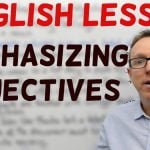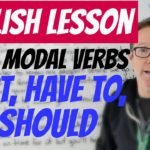Using dependent prepositions in English is easy because we always use the same preposition with the same verb, noun or adjective. This lesson is aimed at people studying B2 level English or above.The prepositions we use depend on the previous word we have used.Examples:We leave Perth at 10am and we arrive in Melbourne 4 hours later. John had a car accident. He … [Read more...] about Using dependent prepositions in English
Grammar
Using Emphasizing Adjectives in English
In this English lesson you will learn about using Emphasizing Adjectives in English. This lesson is aimed at people studying B2 level English or above.We use this type of adjective to show strong feelings and we use an adjective - noun combination.Emphasizing adjective examplesSome examples of this type of adjective are:absolute, complete, outright, pure, real, … [Read more...] about Using Emphasizing Adjectives in English
Using Stative verbs in English
This English lesson is about stative verbs and how we use them in English. What are stative verbs? Verbs are normally either action verbs or a state (stative) verbs.For example, verbs that talk about feelings, thoughts, senses, possession and measures are state verbs.The main characteristic of stative verbs is that they are not used in continuous tenses. … [Read more...] about Using Stative verbs in English
Using Advanced Compound Adjectives
In this English lesson for upper-intermediate and advanced learners (B2/C1) you will learn some of the more difficult advanced compound adjectives we use in English. Learning these compound adjectives will improve your fluency in English and help you communicate better. I will go through the adjectives in the order they appear in the video. Make sure you watch … [Read more...] about Using Advanced Compound Adjectives
How to use modal verbs Must, Have, Should
We all love a modal verb https://youtu.be/KBwryNPMbHAThis English lesson is about how to use the modal verbs Must, Have, Should. It is important to know how to use these verbs correctly. This lesson will show you how. We use must and have (to) fairly similarly. Should and must are also similar, so they can be a bit confusing for people learning … [Read more...] about How to use modal verbs Must, Have, Should




